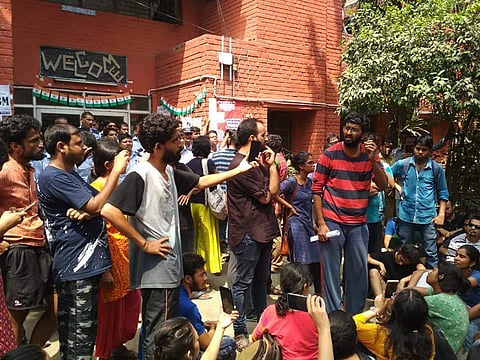

Days after the JNUSU alleged that the questions for the entrance test for the Centre for Economic Studies and Planning (CESP) were copy-pasted from other websites, the Union is now saying that the Linguistics MA and MPhil papers were massively copied too. The Union is claiming that the linguistics papers has been copied from R Gupta's Popular Master Guide UGC-NET Linguistics Paper II & III 2015 edition.
The JNUSU has been campaigning against online exams ever since it was announced. They have repeatedly stated that the decision was arbitrary and no one was consulted despite the fact it is a matter that should have been addressed at the academic council meeting. "We raised so many concerns and doubts about switching to online and today our fears have been realised," said Sai Balaji, the President of the JNUSU.
On May 28, the JNUSU said that the BA Cluster One paper exam paper was being circulated on WhatsApp. Then a few days ago they came out with plagiarism allegations for the CESP entrance paper and now they have stated the same for the Linguistics paper. They have released a PDF comparing all the questions with the ones on the UGC Guide and say some of the questions have been given verbatim. In some cases, even when the answer key in the book is wrong then answer key is also printed wrongly in the JNUEE.
The students claimed 30 questions were found to have been copied from a question bank and 70 out of the 100 questions were research methodology questions. No syllabus was provided for these questions, they state. "Further, most of these 30 research questions are very poorly phrased and would have caused nothing but trauma for the students who gave the exam. There are also questions that are trivial and irrelevant and do not seem to be a genuine attempt to test research aptitude and knowledge," the Union said in its report.
"The conduct of JNUEE by NTA has seen large scale discrepancies and flaws. Students had to face difficulties at all stages of the entrance examination process right from the application process until the online test. Wide-scale errors in the answer key provided by the NTA have been reported by students," the JNUSU statement read. "It is extremely unfortunate and unprofessional that the answer key of all the subjects from BA to PhD had errors. Some questions itself were wrong. BA cluster 2 answer key had more than 10 errors. For subjects such as Chemistry and English there were as many as five answers wrong," they explained.
The statement also pointed out that this year's paper is dicriminatory because people from all backgrounds appear for the exam and this year the paper allegedly only tested the rote learning of linguistics textbooks and candidates’ knowledge of English. "No syllabus was provided for the exam in the prospectus. This focus is simply discriminatory, considering that the exam must cater to students from the many social and linguistic backgrounds that make up this country. Many questions presuppose knowledge of linguistics and are based on syllabus usually covered by universities at the MA level. Many questions have also been found to be ambiguous, having more than one correct option as the answer, " it said.
Of the 100 questions in the MPhil question paper, approximately 70 were from linguistics while around 30 were research methodology questions. No syllabus material for research methodology was specified in the prospectus.
So far the entrances have been held offline and the candidates could answer in any language that they were comfortable in. The questions were a mix of objective and subjective answers, in the online exams, they are all MCQs. "For some questions, all the options might be the answer, you can't have one right answer. That's why we need a mix of questions. How can you have only MCQ's in cases like these?" Balaji questioned.
"The way answer keys were demanded months before the exam was held and the way the responsibility to conduct JNUEE was given to third-party private vendor, National Testing Agency for first time in JNU 50 years and the evaluation of result to another private agency at a higher price only raised suspicions about the intentions of JNU administration," he added.
Now the National Testing Agency is demanding Rs 1000 for each question that the students might want to reevaluate. "Candidates were given a mere forty-eight hours to challenge the answer key, and were required to pay a whopping 1000 rupees for each question challenged (to be refunded if the challenge was correct). No procedure was specified as to how and when their challenge would be resolved and the date for the declaration of results was announced as the 10th of June, i.e. the very next day after the deadline for challenges elapsed. As a consequence, many candidates, in spite of knowing many answers to be wrong, were apprehensive of mounting challenges," the JNUSU said.
"They have not even conducted the exam properly and they think it is okay to demand 1000 rupees?" questioned Balaji.
Balaji also pointed out that no JNU staff was present at the test centres this year. "How can we have exams for JNU without having any staff from JNU present there?" he added.
The JNUSU is now demanding the JNU conduct a judicial probe into the matter, "NTA should immediately release a revised answer key for all courses and programmes. JNUSU demands restoration JNU's time tested offline entrance system having a suitable mix of subjective and objective questions." The JNUSU is also demanding that the VC step down for "ruining careers and lives of Students through his dubious model of online entrance exam."
